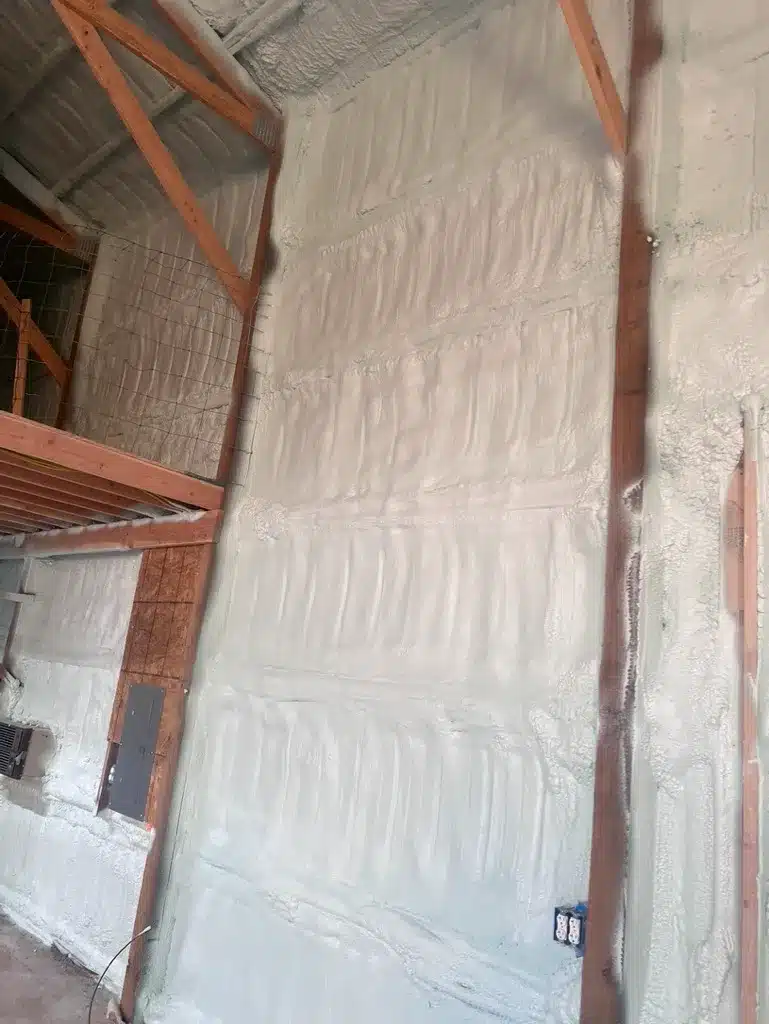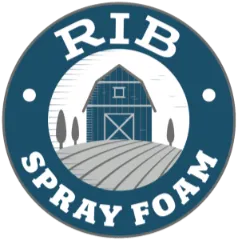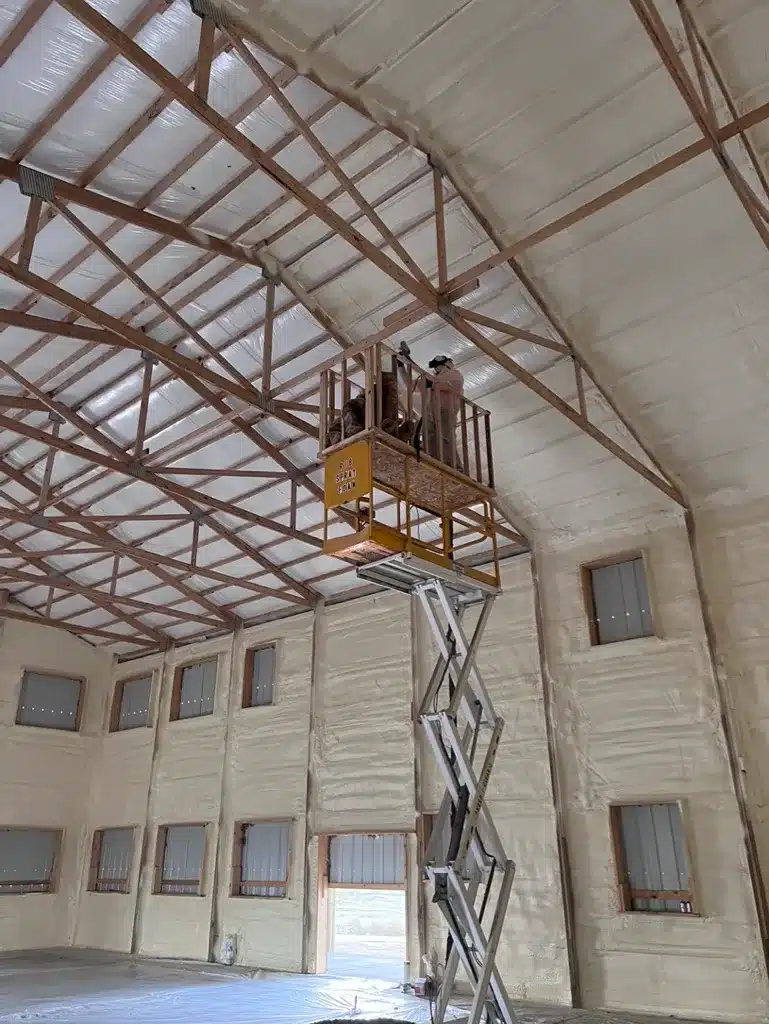Installing spray foam insulation requires precision, material knowledge, and an understanding of building science. In Hudson, professional installation becomes necessary when structural integrity, climate-specific performance, or energy efficiency depend on accurate application. Unskilled or DIY approaches often lead to coverage gaps, thermal bridging, or moisture issues that offset insulation benefits.
Hire a professional spray foam installer when:
- The project involves closed cell spray foam
- The area includes crawl spaces, pole barns, or new construction
- Thermal resistance (R-value) and air sealing are critical
- Code compliance and long-term building performance are priorities
This article explains when professional help is necessary, based on technical criteria, local climate requirements, and material specifications. Rib Spray Foam Company provides these insights based on direct project experience across Weld County and surrounding Colorado regions.
Key Differences Between DIY and Professional Spray Foam Installation
| Factor | DIY Application | Professional Installation |
|---|---|---|
| Equipment Used | Low-pressure kits | High-pressure, commercial-grade rigs |
| Coverage Uniformity | Inconsistent | Precise, full-coverage |
| Thermal Bridging Risk | High | Minimal |
| Code Compliance | Often missed | Verified and documented |
| Application Speed | Slow | Fast and efficient |
| Suitable for Closed Cell | Rarely | Yes |
| Warranty or Guarantee | None | Often provided |
Hudson Climate Considerations for Spray Foam Insulation
Hudson experiences cold winters and wide temperature swings. Professional spray foam application helps mitigate moisture movement, air infiltration, and energy loss in these conditions. Closed cell foam is often used to protect against condensation in crawl spaces and barn walls, where DIY methods tend to fail.
Bonus Tip
In climates with freeze-thaw cycles, closed cell spray foam prevents wood rot and condensation-related damage far more effectively than batt or blown-in options.
Technical Specifications That Require Professional Handling
| Specification | Closed Cell Spray Foam | Open Cell Spray Foam |
|---|---|---|
| R-Value per inch | 6.5 – 7.0 | 3.5 – 3.8 |
| Vapor Barrier | Yes | No |
| Air Seal Performance | High | Medium |
| Structural Support | Yes | No |
| Application Temperature Range | 40°F – 120°F | 60°F – 100°F |
| Thickness per Pass | 2″ max per pass | 3″+ per pass |
When Is Professional Installation Mandatory?
New Construction
Building codes often require energy audits and documentation. Professional installers meet those requirements with tested materials and certified application.
Pole Barns
These structures need vapor control and structural integrity. Spray foam applied by trained crews resists moisture intrusion and reinforces frame joints.
Crawl Spaces
Improper insulation leads to mold, mildew, and heat loss. Professionals install vapor-sealing foam that prevents ground moisture from reaching the subfloor.
Closed Cell Applications
The pressurized system used in closed cell spray foam cannot be replicated with DIY kits. Professional-grade setups are required for even application and safe curing.
Bonus Tip
In Colorado, foam insulation thickness must sometimes be adjusted to meet both R-value and ignition barrier codes. A qualified installer will apply spray foam accordingly.

Market Data on Performance and Energy Savings
- Closed cell spray foam reduces energy costs by up to 50% in buildings with high air leakage (Source: U.S. Department of Energy).
- In regions like Weld County, up to 25% of heat loss occurs through crawl spaces and rim joists, areas best served by closed cell foam (Source: Colorado Energy Office).
- Professional installation extends insulation lifespan by 30-40% over improperly applied alternatives (Source: Building Science Corporation).
Things to Consider Before Making a Decision
- Building Use: A residence, agricultural facility, or new build all have different insulation demands.
- Climate Performance: Closed cell foam performs better in high-condensation zones like crawl spaces or barns.
- Code Requirements: Hudson and Weld County codes may require certain R-values or vapor barriers.
- Access Points: Tight areas like rim joists or under-floor sections require trained installers to avoid application errors.
- Budget vs. Longevity: DIY may save short term, but professional installation ensures material performance over decades.
Bonus Tip
Check whether your utility company offers rebates for professional insulation upgrades. These rebates often apply only to licensed contractors.
Services That Meet the Demands of These Installations
Rib Spray Foam Company provides services aligned with professional installation needs:
- Closed Cell Spray Foam: High R-value insulation with air and vapor barrier benefits.
- Crawl Space Spray Foam: Insulation designed for moisture-prone areas.
- Pole Barn Spray Foam: Improves energy retention and durability in large agricultural structures.
- New Construction Spray Foam: Helps meet code and efficiency benchmarks from the start.
Common Questions Before Choosing a Professional Installer
Can spray foam be added over existing insulation?
Only in some cases. Closed cell foam must bond directly to clean surfaces.
What makes closed cell better for crawl spaces?
It’s water-resistant, offers higher R-value, and adds rigidity.
How long does spray foam last?
Professionally applied spray foam can last over 30 years with no degradation.
Is professional installation noisy or disruptive?
Most jobs are completed in one day and don’t require major structural changes.
Get Expert Insulation Guidance
Get accurate installation, better performance, and long-term value from certified spray foam professionals.
Contact Rib Spray Foam Company for expert guidance:
- Phone: (970) 518-2883
- Email: [email protected]
Frequently Asked Questions
How should spray foam be maintained after installation?
No maintenance is needed if applied correctly. Avoid mechanical damage and monitor for leaks in surrounding systems.
Can open cell foam be used in cold climates?
Not recommended for exterior walls or unvented crawl spaces. Closed cell performs better in freeze conditions.
Does spray foam prevent pest intrusion?
Yes. It seals small gaps and cracks that pests typically use to enter.
Is it safe for indoor air quality?
Once cured, closed cell spray foam is inert. Professional installers ensure safe curing and ventilation.
How do you verify the installer is qualified?
Look for third-party certifications (e.g., SPFA), past project experience, and local references.



